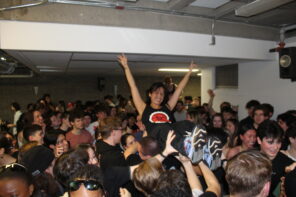The Legislative Council of the Students’ Society of McGill University (SSMU) currently faces mass outcry from the McGill community and beyond over its handling of some of its councillors’ involvement with Hillel Montreal’s Face to Face program, a free trip to Israel and Palestine for eligible student leaders. As the controversy simmers, The Bull & Bear clarifies the nature of the trip, the application of the SSMU’s Conflict of Interest Policy, and the controversy surrounding accusations of anti-Semitism directed at the McGill student government’s handling of diverse political opinions.
What is Hillel Montreal’s Face to Face trip?
In a November 13 article for the McGill Daily, Students in Solidarity for Palestinian Human Rights (SPHR) McGill and the McGill Chapter for Independent Jewish Voices described that several members of the SSMU as well as the Black Students’ Network (BSN) had been approached by Hillel Montreal, who offered them an all-expenses-paid trip to Israel and Palestine. In an invitation sent to some “top student leaders, both Jewish and non-Jewish,” Hillel Montreal promised an “intensive experiential seminar that will explore the region’s deep history and grapple with nuanced political and religious realities from various angles and perspectives.”
Of the student officials invited, VP Finance Sam Haward, VP Internal Sanchi Bhalla, Indigenous Affairs Commissioner Tomas Jirousek, and two executives from the BSN refused the offer. Haward and Bhalla cited inconsistencies in their treatment from Hillel Montreal: Bhalla reported that a Hillel representative had approached her confidentially, whereas Haward received the aforementioned formal written invitation.
Hillel Montreal is a branch of Hillel, the largest Jewish student organization in the world, which states that its mission is “to inspire every Jewish college student to develop a meaningful and enduring relationship to Israel and Israelis.” Led by both Canadian and Israeli officials, the Face to Face trip was allegedly intended to showcase a variety of viewpoints on the Israel-Palestine conflict in a nuanced, educational context.
Claiming that the Hillel Montreal trip was pro-Israel propaganda, the Daily article called Face to Face a “thinly-disguised hasbara trip,” using a Hebrew word for pro-Israel messaging. The article supported this claim by arguing that the trip was funded by the Maccabee Task Force (MTF), an organization that attempts to combat the Boycott, Divestment, Sanctions (BDS) movement. In fact, while MTF is one of the organizations that contributes to Hillel in North America, Hillel Montreal is a subsidiary of Federation CJA, a broad fundraising organization that allocated about 47 million dollars to various groups in the past fiscal year. The money they allocate is donated by a much broader array of individuals as well as local, national, and international organizations and foundations.
Three student officials currently plan to attend the trip: AUS VP Finance Stefan Suvajac, Arts Representative Andrew Chase, and Science Representative Jordyn Wright, a member of the SSMU Board of Directors (BoD). Although he initially planned to participate, Arts Representative and BoD member Adin Chan said that he chose not to attend the trip for personal reasons, after many conversations with those affected by the conflict.
In response to Hillel Montreal, the SSMU executives sent an open letter demanding that Hillel Montreal publicize three points: Hillel’s reason for extending the invitations, the individuals to whom the invitations were extended, and the organization’s reasons for choosing these individuals. As of December 2, Hillel Montreal has yet to officially and publicly respond.
Compliance with the SSMU’s Conflict of Interest Policy
A highly contentious international issue, the Israeli-Palestinian conflict has long been a source of tension for McGill’s student leaders. Other recent controversies within the SSMU include various debates surrounding BDS on campus, two councillors’ resignations last year following the rejection of a course fee for a political science summer course held in Israel (POLI 339), and the 2017 debate over the constitutionality of members of the BoD being affiliated with Jewish organizations.
One of the central questions in this controversy is whether or not the Hillel Montreal trip constitutes a conflict of interest.
At the November 14 SSMU Legislative Council meeting, Medicine Senator Andre Lametti questioned whether the councillors attending Hillel’s trip would be indebted to Hillel, and would therefore be persuaded to vote in favor of Hillel’s opinions on the state of Israel when the council made decisions on campus issues related to the region. VP External Affairs Adam Gwiazda-Amsel called attending the trip “an inherently political [decision].” At this session, Gwiazda-Amsel proposed a motion that would have forbidden members from participating in Face to Face, but this motion failed to pass the required two-thirds majority vote.
One of the central questions in this controversy is whether or not the Hillel Montreal trip constitutes a conflict of interest for student government officials. The SSMU’s Conflict of Interest Policy states that a conflict of interest is any situation that could affect a councillor’s impartiality. As per this policy, SSMU members must properly address potential conflicts “in an appropriate manner when they ought reasonably to have known to disclose [them].” When they disclosed their invitations and refusal to attend the trip, Bhalla and Haward had deemed Hillel’s approach a breach of this policy.
Many critics of the SSMU officials who have opted to attend the program have cited Section 4.F of the policy, which states that councillors must “be prudent in choosing whether to accept a gift, hospitality, donation, or other benefit from a person, group, or organization which may influence a decision or result from securing a financial transaction between the aforementioned and the Society.” According to the leaked invitation letter, Hillel invited only a “select group of student leaders.” Assuming that Hillel Montreal’s trip was a gift given to the SSMU members as a result of their position in student leadership, the all-expenses-paid trip would well exceed the stated maximum of $50 for token courtesies, thereby putting the official “in a position of obligation” to Hillel.
Some councillors protested the suggestion that attending the trip violates the policy, arguing that the trip did not in fact constitute a gift and that Hillel would not necessarily influence their political decisions upon return. For instance, both Chase and Wright maintained that they had previous relationships with Hillel Montreal; Chase suggested that Hillel Montreal coordinators independently deemed him a potential fit for the program, rather than inviting him due to his position in student government.
The Board of Directors, the SSMU’s highest legislative body, ruled that Wright was not in violation of the Conflict of Interest Policy, but that as a preventative measure, Wright would sit out when SSMU councils discussed the region after she had attended the trip. On November 28, the Legislative Council undermined this ruling when President Bryan Buraga added several amendments to the motion, which narrowly passed by one vote.
These new amendments stated that Wright, as a Councillor and a Director, had violated the conflict of interest policy; that the SSMU would take the position of asking Wright to decline Hillel’s offer; that if Wright did not decline, the BoD would vote to remove her “by reason of impropriety and delinquency of duties”; and that the SSMU Legislative Council should urge the BoD to vote in favour of Wright’s removal should the decision come to the BoD.
Legislative Council accused of anti-Semitism, executive overreach
On November 29, Wright took to Facebook to protest the Legislative Council decision and her treatment from the Science Executive Committee, which had also pushed her to resign. In a post that has since garnered thousands of likes, overwhelmingly supportive comments, and mainstream media attention, Wright accused various members of student government of singling her out: “Only I was targeted, despite the fact that another non-Jewish Councillor will also be joining me on the trip,” Wright wrote. “I am outraged and disgusted, but not surprised. This is not the first time that Jewish students at McGill have been bullied out of student government.”
Many members of the McGill community view the controversy as indicative of a larger trend within the SSMU: systemic intolerance of diverse political opinions.
Wright explained the importance of her Jewish identity, writing that while she personally connects her heritage with Israel, her view does not preclude “sympathy for the continued suffering of the Palestinian people.” She also asserted that the SSMU was engaging in anti-Semitism, given that the SSMU follows the International Holocaust Remembrance Alliance (IHRA) definition of anti-Semitism, which lists “holding Jews collectively responsible for actions of the State of Israel” as an example of the way anti-Semitism manifests itself in relation to Israel.
Pointing out that all student government members have a variety of political opinions that they “constantly and necessarily separate… from [their] roles as student representatives,” Wright argued that she was being targeted not because of a conflict of interest, but because her political views differed from many council members.
Indeed, regardless of the nature of Hillel’s trip or the Conflict of Interest Policy, many members of the McGill community view the controversy as indicative of a larger trend within the SSMU: systemic intolerance of diverse political opinions, especially those regarding the Israeli-Palestinian conflict.
“I think the biggest issue here is ‘resign culture’ and the toxic culture at SSMU, where we see the solution to our problems as resignation. Naming and shaming people and calling on them to resign is an impulse that seems to dog all of student government at McGill,” Arts Representative and BoD member Adin Chan told the Bull & Bear. “It’s time that we stand up for better from our student leaders and we call for better from our student government.”
According to Chan, the BoD’s decision that Wright would have to recuse herself from discussing the region was already a heavy-handed measure. He argued that the Legislative Council’s additional amendments pushing Wright to resign propagated what he called the SSMU’s toxic culture, stating, “If [the Board] established a remedy for the conflict of interest… there is really no grounds to call on Wright to resign, because there is no wrongdoing as decided by the highest body. I think that this is executive overreach, [and] I think that this is a lack of respect for the legitimacy of the Board of Directors.”
Many other SSMU officials have also publicly stood behind Wright in addition to Chan. Eleven councillors signed an open letter to the Board of Directors, published in The Bull & Bear, asserting that the Legislative Council had overstepped its mandate. “We believe that certain SSMU officials, especially those elected to high positions, have demonstrated a continual inability to acknowledge dissenting opinions or concerns,” the letter reads. “Frankly, these officials have shown themselves to be unable to respect others’ right to disagree in a political context while still collaborating effectively as student representatives… which is manifesting itself in the normalization of a concerning ‘call-out culture.’”
Echoing this view, Deputy Provost Fabrice Labeau called on the BoD to take action, asserting in a December 2 email to the student body that the Legislative Council’s actions were “contrary to the University’s values of inclusion, diversity and respect” and represented a divergence from “the SSMU’s own Constitution.” He went on to call the Council’s actions “a very serious breach of trust.”
Naming and shaming people and calling on them to resign is an impulse that seems to dog all of student government at McGill.
Labeau wrote, “While diversity of opinion is fundamental and should be respected at all times, polarization that reaches a point where it fosters a culture of ostracization, or when our students do not feel respected on our campuses because of their identity, religious and political beliefs, will not be tolerated.”
Labeau’s email constitutes the first official response by McGill administration to this unfolding controversy. In the week since Thursday’s volatile Legislative Council session, media outlets such as the Jerusalem Post, MSN, the Canadian Jewish News, and Haaretz have reported on fragments of this developing story.
This is a developing story, and it will be updated accordingly.









Finally, Mcgill reporting that I feel like I can actually trust.